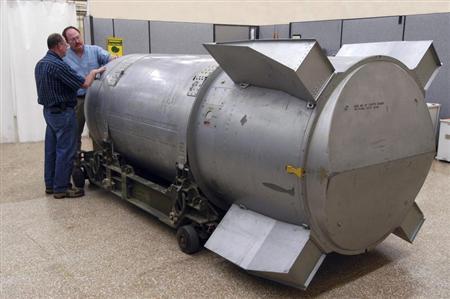Russia's defense minister on Tuesday accused U.S. bombers of rehearsing a nuclear strike on Russia from two different directions earlier this month and complained that the planes had come within 20 kilometers of the Russian border.
But the Pentagon said its drills were announced publicly at the time and adhered to international protocols.
Moscow's accusation comes at a time of high tension with Washington over Ukraine, with U.S. officials voicing concerns about a possible Russian attack on its southern neighbor – a suggestion the Kremlin has dismissed as false.
Moscow has in turn accused the United States, NATO and Ukraine of provocative and irresponsible behavior, pointing to U.S. arms supplies to Ukraine, Ukraine's use of Turkish strike drones against Russian-backed separatists in eastern Ukraine, and NATO military exercises close to its borders.

A B53 nuclear bomb at the B&W Pantex nuclear weapons storage facility outside Amarillo, Texas, on October 25, 2011. /Reuters
A B53 nuclear bomb at the B&W Pantex nuclear weapons storage facility outside Amarillo, Texas, on October 25, 2011. /Reuters
Russian Defense Minister Sergei Shoigu said that Moscow had noted a significant increase in the activity by U.S. strategic bombers, which he said had carried out 30 flights close to Russia this month. That, he said, was 2.5 times more than the same period last year.
Shoigu complained in particular of what he said was a simulated U.S. nuclear strike against Russia earlier this month.
The defense minister underlined that during the U.S. military exercises "Global Thunder", 10 American strategic bombers rehearsed launching nuclear weapons against Russia from the western and eastern directions," Shoigu was quoted as saying in a defense ministry statement.
"The minimum proximity to our state border was 20 kilometers."
Shoigu was quoted as saying that Russian air defense units had spotted and tracked the U.S. strategic bombers and taken unspecified measures to avoid any incidents.
The Pentagon pushed back.
"These missions were announced publicly at the time, and closely planned with (Strategic Command), (European Command), allies and partners to ensure maximum training and integration opportunities as well as compliance with all national and international requirements and protocols," said Lieutenant Colonel Anton Semelroth, a Pentagon spokesperson.
Source(s): Reuters

